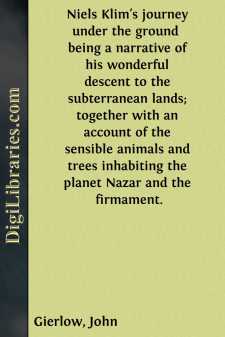Categories
- Antiques & Collectibles 13
- Architecture 36
- Art 48
- Bibles 22
- Biography & Autobiography 813
- Body, Mind & Spirit 142
- Business & Economics 28
- Children's Books 16
- Children's Fiction 13
- Computers 4
- Cooking 94
- Crafts & Hobbies 4
- Drama 346
- Education 46
- Family & Relationships 57
- Fiction 11829
- Games 19
- Gardening 17
- Health & Fitness 34
- History 1377
- House & Home 1
- Humor 147
- Juvenile Fiction 1873
- Juvenile Nonfiction 202
- Language Arts & Disciplines 88
- Law 16
- Literary Collections 686
- Literary Criticism 179
- Mathematics 13
- Medical 41
- Music 40
- Nature 179
- Non-Classifiable 1768
- Performing Arts 7
- Periodicals 1453
- Philosophy 64
- Photography 2
- Poetry 896
- Political Science 203
- Psychology 42
- Reference 154
- Religion 513
- Science 126
- Self-Help 84
- Social Science 81
- Sports & Recreation 34
- Study Aids 3
- Technology & Engineering 59
- Transportation 23
- Travel 463
- True Crime 29
Niels Klim's journey under the ground being a narrative of his wonderful descent to the subterranean lands; together with an account of the sensible animals and trees inhabiting the planet Nazar and the firmament.
by: John Gierlow
Categories:
Description:
Excerpt
INTRODUCTION.
Lewis Holberg, the author of the Narrative of Niels Klim, was the most eminent writer among the Danes in the eighteenth century. His works show a surprising versatility of genius, comprising Histories and Treatises on Jurisprudence, together with Satires and Comedies. He was by birth a Norwegian, but was educated at the University at Copenhagen in Denmark. Soon after receiving a theological degree from that Institution, he visited Holland and England, and resided about two years at Oxford. Shortly after his return he published an "Introduction to European History," and an "Appendix to the Universal History," in which he gives an account of contemporaneous affairs in the principal governments of the world. His historical labors were interrupted by a royal appointment to a professorship in the University. This office he enjoyed for five years, and then went abroad. In his Autobiography he has given an interesting account of his travels, both at this time and subsequently, and has described men and manners in a way highly entertaining, and generally just. He visited most of the cities of Southern Europe, abiding some time in each. He was well received by men of letters, and made many valuable acquaintance, wherever he went. After remaining one whole winter at Rome, and accomplishing the object of his mission, he returned to Copenhagen. His income was now small, and for two years he was oppressed with great pecuniary difficulties. It was during this period that he published in the Danish language, his "Introduction to the Law of Nature and of Nations." In this treatise, Holberg aimed rather to apply the principles of Natural Law to the Laws and Constitutions of Norway and Denmark, than elaborately to discuss the principles themselves. The work was coldly received at its first appearance, but, after ten or twelve years began to excite public attention, and passed through several editions.
At length, the professorship of metaphysics becoming vacant, he received the appointment. The emoluments of this office, though small, supplied his necessities, and, not long after, on obtaining a more lucrative station in the University, he was relieved from his embarrassments.
Hitherto, he had devoted himself almost exclusively to Jurisprudence, History and Languages, and had never tried his hand at poetical composition. Indeed, he had ever felt a strange aversion to the study of poetry, and, although he had read the Latin Poets, and composed Latin Poems, it was more for the sake of proficiency in the language, than for pleasure, or, in his own words, "as a sick man swallows bitter draughts, not because they are grateful to the palate, but, because they are recommended by the physicians."
He now, however, seemed inspired by a new ambition, and set himself to imitate one of Juvenal's Satires. Encouraged by his unexpected facility, he projected and composed an original poem. Its success, when published, surpassed that of any work previously written in the Danish language. Judicious critics heartily commended it, and some even looked upon it as introducing a new era in the national literature. It was also published in Sweden and Germany, and raised the author's reputation abroad. He next published five more Satires, prefixing to each a short preface, unfolding the writer's design. His poetical productions were a source of more honor than gain, and, becoming weary of almost profitless pursuits, he abandoned poetry, and devoted himself to his former studies.
Nevertheless, the solicitations of friends prevailed upon him to turn his attention to Dramatic composition....


